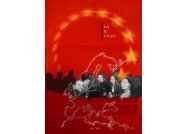turkish-greek civic dialogue - AEGEE Europe
turkish-greek civic dialogue - AEGEE Europe
turkish-greek civic dialogue - AEGEE Europe
Create successful ePaper yourself
Turn your PDF publications into a flip-book with our unique Google optimized e-Paper software.
all know –and it was also eloquently shown in the Sakarya meeting– that history<br />
is used as a tool by national policies.<br />
It was a very interesting and “difficult” conference. Kemal Arı and Ayhan Aktar<br />
said that they could hardly imagine such a conference taking place in Turkey<br />
5 years ago, and I could add the same for Greece –maybe without the 5 year<br />
horizon.<br />
The most important speeches –in terms of the richness of thoughts and emotions<br />
they triggered in me– were, I think, those of Halil Berktay, who talked about<br />
his emotions regarding the history of his family, Nikos Agriantonis, who showed<br />
us that, in our cases, people (and the states) treat the monuments built by the<br />
“enemy” as if they were the enemy itself, and finally Elif Babül, who presented<br />
to us the multifaceted tribulations and suffering of Ίμβρος /Gökçeada island<br />
–not of the rocks and trees, but of the people involved.<br />
From the very first moment I had the feeling that our symposium, with the<br />
poetic subtitle “yeniden kurulan yaşamlar” – “ζωέs ξαναστημένες απ’ την<br />
αρχή” approached the whole issue in a very good way. And I realised that it was<br />
an excellent symposium when, a month later, I attended a similar symposium<br />
in Thessaloniki, organised by a similar refugee association, where the main<br />
topics were: a) The violation of the Lausanne Treaty -by the Turks they meant,<br />
b) 80 years since the Lausanne Treaty and the oblivion policy, c) Violation<br />
of the reciprocity clauses –additional rights for the Western Thracian Muslims<br />
according to Turkish demands. I don’t mean to be racist, but I can tell you that<br />
there were only some 150 old people attending it.<br />
I am fully convinced that OUR project Greek–Turkish <strong>civic</strong> <strong>dialogue</strong> –allow me<br />
to use the word “our”; this is how I feel about it- has achieved many important<br />
things, by bringing Greek and Turk youth together to have fun, to communicate,<br />
to think about education, to think about prejudice in an attempt to overcome<br />
it. But if I were asked to answer in one word if it was a success or not, I would<br />
answer with no hesitation: hm, perhaps. If this project were evaluated in<br />
technocratic terms, such as the number of participants, the number of proposals<br />
submitted for subprojects, the number of training activities implemented, it<br />
would most probably appear to be highly successful.<br />
But what about more qualitative or more political criteria? What do I mean? Of<br />
course I accept that things like the approach between people and workshops<br />
Association des Etats Généraux des Etudiants de L’<strong>Europe</strong><br />
on deconstructing prejudice are very important. But I do not believe that the<br />
Greek-Turkish conflict is a result of a huge misunderstanding and will therefore<br />
be resolved in this way. Having in mind that in order to tackle a question and<br />
try to contribute to a solution, we first need a sound analysis, and also that<br />
the solution is strongly connected to the way the problem is defined, allow me<br />
to proceed to a short analysis. The Greek-Turkish conflict does not lie on a<br />
cultural basis. It is not because Greek and Turk shepherds milk their sheep in<br />
different ways, or because Greek and Turk construction workers built walls in<br />
different ways, or because Greek and Turk artists compose in different forms,<br />
nor because Muslims and Christians disagree on the precise job of angels in<br />
paradise.<br />
The Greek-Turkish conflict is based on questions related to the exploitation<br />
of wealth-generating resources and on questions related to power and<br />
dominance. And that’s where we must focus. Otherwise our big efforts will<br />
bear little fruit, if any, and we will be like the guy in the proverb –the same<br />
in Greek and Turkish- who “θύμωσε με το γάιδαρο και χτυπάει το σαμάρι”<br />
- “eşeğe kızdı, hırsını semerden aldı”. So, according to my analysis, the Greek-<br />
Turkish conflict lies on economic and power issues. These have been the main<br />
reasons for conflicts over the centuries. But what we have nowadays in this<br />
part of the world is a different way to handle them. Now we accept that arms<br />
are neither the only nor the best way to solve our problems. Besides, we all<br />
understand that the type of game in which Greece and Turkey are involved can<br />
change from a “win or lose” situation to a “win-win” situation. Negotiation,<br />
mutual understanding, mutual profit are the key words.<br />
This is my analysis and my proposals. Of course, I do not demand that it be<br />
adopted. I am ready to consider and examine different analyses, to discuss<br />
all of them and arrive at a synthesis on the basis of which we shall trace our<br />
courses and establish monitoring mechanisms and criteria against which we<br />
shall measure our effectiveness. My sense - and I think most of you agree<br />
with me - is that we are in a good position. Of course there are many more<br />
things to be done. But we have managed to stand by each other, to talk, to<br />
understand the hopes and fears of each other and now we are putting in place<br />
the conditions to start walking together.<br />
LET’S DO IT!<br />
Final Conference<br />
175







